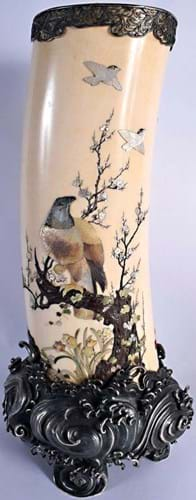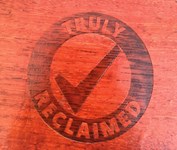
A large Meiji shibayama tusk vase with a silver base, 20in (51cm) coming up for sale at Hannam’s in Selborne on February 24.
Following complaints regarding the lack of clarity around the ‘spring 2022’ enforcement date, the Department for Environment, Food and Rural Affairs (Defra) has suggested there will be an approximate four-month period for businesses to register exempt items before the ban becomes law. The digital registration service is due to launch on February 24.
The art and antiques sector has been frustrated with the Defra’s apparent reluctance to provide a specific date of enforcement (on CITES issues, the department has often been reticent to issue advance deadlines in case it encourages a rush of problem material onto the market).
“Chaotic”
Leading UK auction houses feel they have not been properly informed of the process and are at a loss how to advise their clients. Ian Cadzow, chairman of Roseberys, said: “While we know it is coming in, we have nothing to join the dots and we have no information about how the process will work. This is just politics of the worst sort. Although we know the intention is good, the lack of any detail on the practical application means it is going to be a shambles, however.”
Guy Schooling, chairman at Sworders, concurred: “I would say it is typical of bureaucrats that weeks before the ban is apparently to be introduced we, on the front line of imposing it, have no idea when we may be expected to do so and thus cannot plan for our clients or ourselves. This appears a bit chaotic.”
Defra emphasised to ATG ‘stakeholders’ will be given enough time to prepare. “We are continuing to work closely wi th industry and stakeholders to ensure under s tanding and compliance for when the ban comes into force.”
The Animal and Plant Health Agency (APHA) has the role of regulating the act and is responsible for checking registrations and applications.
Once the law is enforced it will be illegal to sell ivory works of art unless the item meets one of the five narrow exemptions and is registered or has an exemption certificate.
The digital service will allow applicants to apply for certificates and register items they want to sell that they believe to be exempt.
The five exemptions are:
■ Pre-1947 items containing less than 10% ivory by volume.
■ Pre-1975 musical instruments containing less than 20% ivory by volume.
■ Pre-1918 portrait miniatures with a surface area of no more than 320 sq cm.
■ Sales to, and hire agreements with, qualifying museums.
■ Pre-1918 items with outstanding artistic, cultural, or historical value.
Full details of the regulations are on the government website.
Rescue centre
Dealer Michael Baggott has launched the Antiques Rescue Centre/ARC (see ATG No 2530). He hopes antiques that can no longer be sold under the law and that may be at risk of being destroyed can be donated to the charity.














